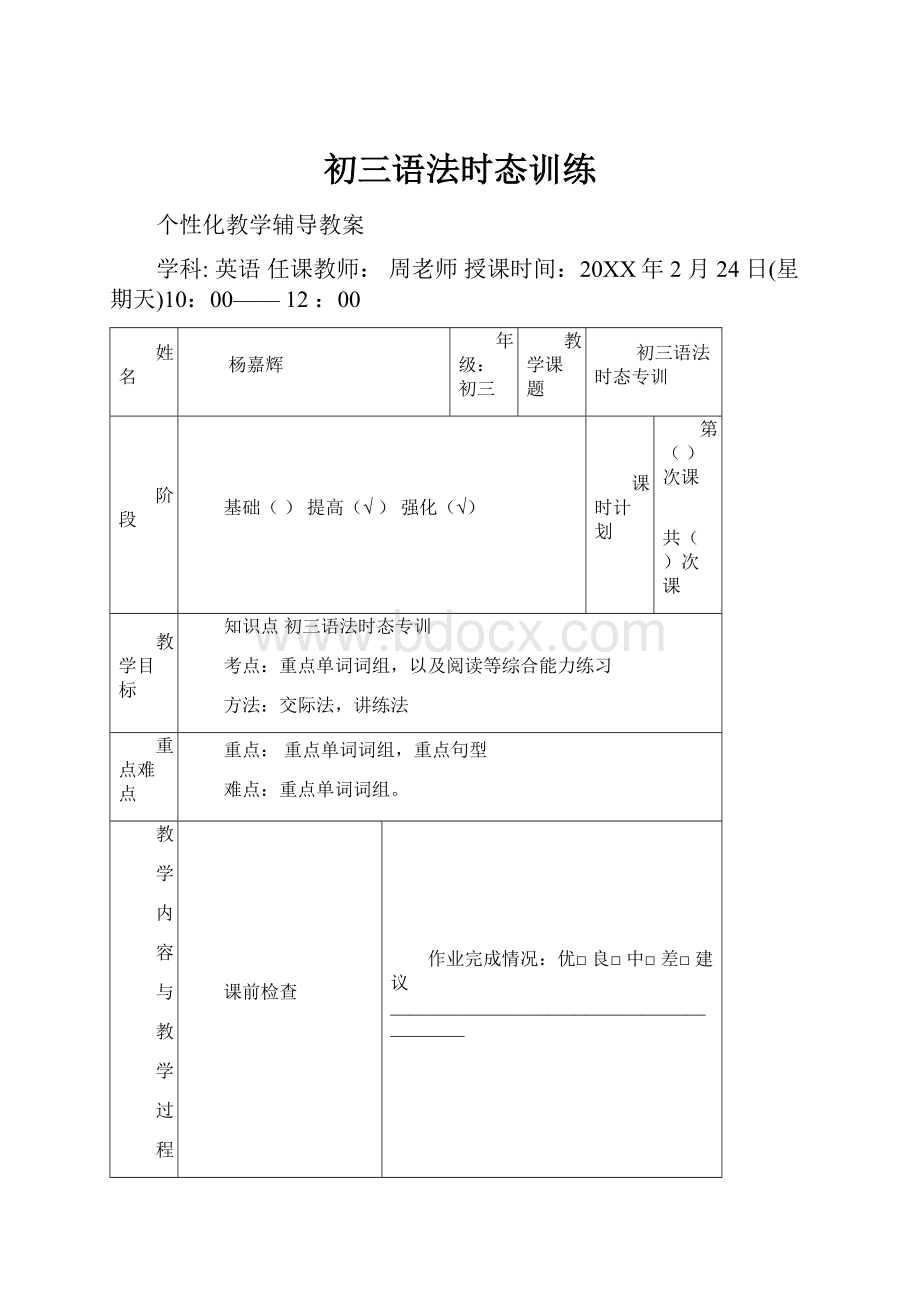初三语法时态训练.docx
《初三语法时态训练.docx》由会员分享,可在线阅读,更多相关《初三语法时态训练.docx(31页珍藏版)》请在冰豆网上搜索。

初三语法时态训练
个性化教学辅导教案
学科:
英语任课教师:
周老师授课时间:
20XX年2月24日(星期天)10:
00——12:
00
姓名
杨嘉辉
年级:
初三
教学课题
初三语法时态专训
阶段
基础()提高(√)强化(√)
课时计划
第()次课
共()次课
教学目标
知识点初三语法时态专训
考点:
重点单词词组,以及阅读等综合能力练习
方法:
交际法,讲练法
重点难点
重点:
重点单词词组,重点句型
难点:
重点单词词组。
教
学
内
容
与
教
学
过
程
课前检查
作业完成情况:
优□良□中□差□建议__________________________________________
一般现在时、现在进行时、一般将来时、一般过去时、现在完成时
时态
定义
谓语动词构成
标志词
例句
一般现在时
经常、反复发生的动作或行为及现在的某种状况。
am/is/are
always,usually,often,sometimes,everyweek(day,year,month…),onceaweek,onSundays。
Theyareveryyoung.
动词原形/第三人称单数
SheusuallygoesshoppingonSundays.
现在进行时
表示现阶段或说话时正在进行的动作及行为。
am/is/are+doing
now,atthistime,thesedays,look,listen,canyousee?
Can’tyousee?
之类的暗示语。
Sheiswritingaletternow.
一般将来时
表示将要发生的动作或存在的状态
will/shall+动词原形
tomorrow,nextday(week,month,year),soon,in+一段时间,by…,thedayaftertomorrow,thisevening,tonight
Studentswillusecomputersnextterm.
表示打算、计划或准备做某事。
am/is/are/goingto+动词原形
I’mgoingtocheckmyemailthisevening.
一般过去时
过去某个时间里发生的动作或状态;过去习惯性、经常性的动作、行为。
was/were…
ago,yesterday,thedaybeforeyesterday,lastweek(year,night,month…),in1989,justnow,attheageof5,oneday,longlongago,onceuponatime,thismorning
IwasinShanghailastyear.
动词的过去式
Theyswamintheseayesterday.
现在完成时
过去发生或已经完成的动作对现在造成的影响或结果,或从过去已经开始,持续到现在的动作或状态。
ShehasnevervisitedUSA.
用括号中所给动词的适当形式填空:
1.Pleasebequick!
Someone__________(wait)foryouintheoffice.
2.Somethingbad_________(happen)tothemlastweek.
3.----YouwerenotinwhenIcalledyouyesterdayafternoon?
----I___________(shop)inthesupermarket.
4.I______(meet)afriendofminewhenI_______(walk)alongNandajieStreetlastSunday.
5.----______(be)youathomeat9o’clocklastnight?
----Yes.I________(take)ashoweratthattime.
6.----Didyouseeaboyinbluepassbyjustnow?
----No,sir.I__________(read)anewspaper.
7.Don’tgoout!
Itis_______(rain)hard.
8.You___________(return)themagazinetohimintwoweeks,aren’tyou?
9.Why________(notgo)you________(go)toschoolyesterday?
10.There________(be)nohospitalshereinthepast.
11.Look!
Whatagoodtimethey__________(have)!
12.________they________(take)anyphotosontheGreatWallyesterday?
13.Wehavemuchwork_________(do)today.
14.Mymotheroften__________(ask)me_________(study)hard.
15.LiuMeiwithherfriends_________(boat)ontheriverwhenI______(see)themyesterday.
16.----Canyou________(come)totomorrow’sparty?
----Sorry,I_________(be)busyatwork.
17.What________theweather_______(be)liketomorrow?
18.----What_______you________(say)justnow?
----Oh,sorry,I__________(think)somethingelse.
19.Theplane_________(leave)intenminutes.
20.Listen!
Thebirds___________(sing)!
21.----Where’sMum?
----Oh,she_________(cook)inthekitchen.
22.Let’saskhimnot__________(talk)loudly.
现在完成时
用动词learn的适当形式填空:
I_______Englisheveryday.
I_______Englishlastterm.
I_______Englishnow.
I_______Englishnextyear.
I_______Englishforthreeyears.
1.概念:
现在完成时表示过去发生的动作对现在造成的影响和结果或者从过去开始一直延续到现在的动作或状态。
2.时间状语:
already,yet,just,never,ever,before,sofar,once,twice或since+时间点…,for+时间段…etc.
3.基本结构:
________________________________
4.否定形式:
________________________________
5.一般疑问句:
_________________________________
eg.
IhavealreadywatchedtheTVplay.我已经看过这部电视剧了。
----Haveyouhadyourlunchyet?
你吃过午饭了吗?
----Yes,Ihave.I’vejusthadit.是的,我刚吃过。
(说明现在饱了)
HehasjustcomebackfromBeijing.他刚从北京回来。
Ihavenevertraveledbyplanebefore.我以前从来没有乘飞机旅行过。
HaveyoueverbeentoShanghai?
你去过上海吗?
IhavelivedinBeijingfor10years.我在北京住了10年了。
Ihavebeeninthisschoolsince2010.从20XX年起我就在这所学校。
6.注意:
1).havebeento/havegoneto
havebeento+地点表示曾经去过某地,现人已返回。
(once,twice….)
havegoneto+地点表示人已去了某地,人还未返回。
(whereissb?
)
eg.
I’vebeentomanycities,butI’veneverbeentoShanghai.
—WhereisHanMeinow?
—ShehasgonetoShanghai.Shewillbebackintwodays.
练习:
Fillintheblankswith“have/hasbeen(to)”and“have/hasgone(to)”:
1.MrsBrownisn’there,she____________thepostoffice.
2.BeiJingishisfavouritecity,he____________theremanytimes.
3.A:
______you__________Sydney?
B:
No,I_____________there.
4.A:
Where________you________thismorning?
B:
I_____________town.
5.A:
Whathaveyoudonethissummerholiday?
B:
I______________afarmwithmysister.
6.MrSmith__________Shanghaionbusiness,he’llbebacknextweek
2).与时间段连用时,短暂性动词应改为相应的延续性动词。
die---bedeadcome/goto----beat/inleave----beawayfrombuy----haveborrow/lend-----keepopen---beopenclose---beclosedstart/begin----beonjoin—--bein/beamemberof/beasoldierbecome–befallasleep---beasleep
eg.误:
Shehasdiedfortenyears.正:
Shehasbeendeadfortenyears.
误:
I’veleftthisschoolforeightyears.正:
I’vebeenawayfromthisschoolforeightyears.
误:
Hehasborrowedmydictionaryfortwodays.正:
Hehaskeptmydictionaryfortwodays.
3).现在完成时的四种句型:
A).主语+短暂性动词的过去式+时间+ago
B).主语+have/has+延续性动词的过去分词+for…./since….ago.
C).It’s+时间段+since+短暂性动词的过去式
D).时间段+haspassed+since+短暂性动词的过去式
Hisgrandfatherdiedtwoyearsago.
Hisgrandfatherhas________fortwoyears.
_____twoyears_____hisgrandfather____.
Twoyears____________hisgrandfather_____.
4).现在完成时与一般过去时的区别
现在完成时与现在有关的时态,他侧重于过去的动作对现在造成的影响。
而一般过去时侧重于表示过去的动作与现在无关,若询问该动作发生的具体的时间时,只能用一般现在时。
Hashereturnedthelibrarybook?
Yes,hehas.
When____he_____(return)it?
He____(return)ityesterdayafternoon.
用括号中所给动词的适当形式填空:
1.Hi,Tom.Howlong_______you______(be)inQingzhou?
2.______youever______(visit)HongKong?
3.He______(live)inChinafornearlythreeyears.
4.I______never______(eat)thehotdogs.
5.I_____(see)thefilm.Idon’twanttoseeitagain.
6.She_________(be)astudentforsixyears.
7.Sofarwe___________(learn)abouteighthundredEnglishwords.
8.Thechildren__________(clean)theclassroomalready.
9.I________(find)myrulerinmydeskfiveminutesago.
10._________youever___________(eat)spicyfood?
11.---Howareyoutoday?
---Oh,I_______(notfeel)aswellasIdonowforalongtime.
时态专项训练
一.一般现在时
1.构成:
(1)be:
am/is/are
(2)do:
do/does
2.标志词:
always,usually,often,sometimes,never,everyday/week/month/year/…
二、一般过去时态
1..构成:
(1)be:
was/were
(2)do:
did
2.标志词:
yesterday,thedaybeforeyesterday,threedaysago,lastnight/week/month…,inthepast;justnow=amomentago
三、一般将来时
1.构成:
(1)will+be/do
(2)begoingto+be/do
2.标志词:
tomorrow,thedayaftertomorrow,inthreedays,in(the)future,nextweek/month/term…,fromnowon...
四、现在进行时
1.构成:
am/is/are+v-ing
2.标志词:
now,atthemoment,Look!
Listen!
Bequiet!
…
3.注意
(1)下列这些动词一般不用于现在进行时态的句子中:
see,hear,like,love,want,wouldlike,be,have,know,think,forget等
(2)有几个瞬间动词可以用现在进行时表将来,如:
begin,start,come,go,leave,arrive
五、过去进行时
1.构成:
was/were+v-ing
2.标志词:
atthattime,thistimeyesterday,then,atthatmoment,at8lastnight,whensb.didsth.
注意在含有when或while引导的时间状语从句的主从复合句中过去进行时的运用:
1)主句中的动作先于从句中的动作发生,且进行的时间较长时,主句用过去进行时(从句用一般过去时)。
eg:
WhentheUFOarrived,IwaswatchingTV.
2)从句中的动作先于主句中的动作发生,且进行的时间较长时,从句用过去进行时(主句用一般过去时)。
eg:
WhileIwaswalkinginthestreet,theaccidenthappened.
3)若主、从句动作同时发生或无所谓先后时,主从句可同时使用过去进行时,此时的时间状语从句一般由while引导。
eg:
Iwasdoingmyhomeworkwhilemyparentsweredoingthechores.
注意:
在上述情况下,若动词为表示状态的延续性动词,一般都应用一般过去时,而不用过去进行时。
eg:
Luckily,whenIwenttoseehim,hewasathome.
*现在进行时和过去进行时比较
1.Idon’treallyworkhere.I____untilthenewsecretary_______.
A.justhelpout;comes
B.havejusthelpedout;willcome
C.amjusthelpingout;comes
D.willjusthelpout;hascome
2.---Whenshallweleave?
---AssoonasI______whatI_______.
A.willfinish;doB.havefinished,amdoing
C.finish,willdoD.finish,do
3.Atthattimehe_____inthelibrary.
A.workedB.hadworkedC.wasworkingD.wouldwork
4.Thestudents____busilywhenMissBrownwenttogetabookshe____intheoffice.
A.wereworking;hadleftB.worked;left
C.hadworked;leftD.wereworking;wouldleave
5.---Hey,lookwhereyouaregoing!
---Oh,I’mterriblysorry._______.
A.I’mnotnoticing.B.Iwasn’tnoticing.
C.Ihaven’tnoticed.D.Idon’tnotice.
E.Ididn’tnotice.F.Iwon’tnotice
*一般过去时和过去进行时比较
1.He______abookaboutChinalastyear,butIdon’tknowifhe______it.
A.wrote;hasfinishedB.waswriting;hasfinished
C.waswriting;hadfinishedD.wrote;willfinish
2.Tom_______intothehousewhennoone________.
A.slipped;wasnoticingB.hadslipped;noticed
C.slipped;hadnoticedD.wasslipping;noticed
3.Asshe______thenewspaper,Granny_______asleep.
A.read;wasfallingB.wasreading;fell
C.wasreading;wasfallingD.read;fell
4.ThelasttimeI_________Janeshe__________cottoninthefields.
A.hadseen;waspickingB.saw;picked
C.hadseen;pickedD.saw;waspicking
六、现在完成时
1.结构:
(1)be:
have/hasbeen
(2)do:
have/hasdone
2.标志词:
already,just,yet,ever,never,sofar(tillnow/uptonow),recently,inthepast3years,before,since+时间点,for+时间段
注意延续性动词与非延续性动词的用法
①非延续性动词不可与表示一段的时间状语连用。
eg:
Thepooroldmanhasdied.(T)
Thepooroldmanhasdiedforthreeyears.(F)
Thepooroldmanhasbeendeadforthreeyears.
但在否定句中,可以与表示一段的时间状语连用。
eg:
Hehasn’tcomehereforseveraldays.
②非延续性动词与一段时间状语连用可采用下述三种方法:
1)将非延续性动词转化为延续性动词:
come→behere,go→bethere,die→bedead,
borrow→keep,buy→have,leave→beaway,
join→bein/bea…member,begintostudy→study,
finish→beover,getup→beup,puton→wea